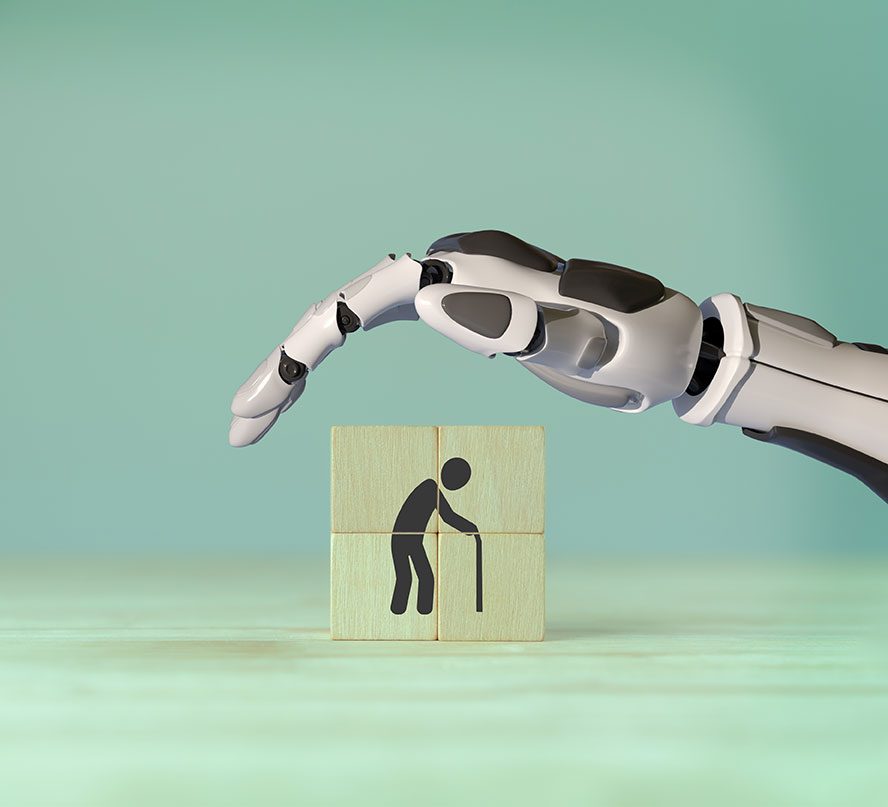The Promise of Better Aging
In an era where technology is rapidly advancing, artificial intelligence (AI) stands out as a beacon of hope, especially for the elderly population. AI is not just a futuristic concept; it’s a practical tool already making significant strides in improving the lives of seniors. This article explores how AI is currently aiding seniors and looks at the potential future advancements that could revolutionize elderly care.
Artificial intelligence (AI) is offering innovative solutions that improve health outcomes and quality of life. Each application of AI in this field represents a significant step towards a future where aging is accompanied by support, comfort, and dignity. Here are some current applications of AI in senior care:
1. Health Monitoring and Predictive Analysis
One of the most significant contributions of AI in senior care is in health monitoring. AI-powered devices and wearables can track vital signs like heart rate, blood pressure, and sleep patterns. Beyond monitoring, AI’s predictive analytics can analyze this data to identify potential health risks, enabling early intervention and preventing severe health crises.
2. Personalized Medicine
AI algorithms can analyze vast amounts of medical data to tailor treatment plans for individual seniors. This personalized approach to medicine considers the unique health profiles and genetic information of individuals, leading to more effective and targeted treatments.
3. Cognitive Assistance
For seniors suffering from cognitive impairments or diseases like Alzheimer’s, AI-driven applications provide assistance through memory games, reminders, and interactive interfaces. These tools help maintain cognitive functions and offer support in daily activities.
4. Social Robots and Companions
AI-powered social robots are being used to provide companionship to seniors, particularly those who live alone. These robots can converse, respond to questions, and even detect emotional cues, helping to reduce feelings of loneliness and isolation.
5. Virtual Health Assistants
AI virtual assistants are increasingly being used for health-related inquiries and reminders. They can manage medication schedules, set up appointments, and provide information on various health topics, making healthcare management more accessible for the elderly.

The Future of AI in Elderly Care
Looking ahead, the potential of AI to transform senior care is immense. Here are some of the promising advancements on the horizon:
1. Advanced Predictive Health Monitoring
Future AI systems could predict health issues before they occur by analyzing more complex health data and patterns. This advancement could shift the focus from treatment to prevention, significantly improving seniors’ health outcomes.
2. Enhanced Mobility Aids
AI could lead to the development of more sophisticated mobility aids, like smart walkers and wheelchairs that can navigate and avoid obstacles autonomously, offering greater independence to seniors with mobility issues.
3. AI in Home Care
AI could be integrated more deeply into home care, with smart homes equipped to monitor seniors’ well-being continuously and respond to emergencies. These homes could also adapt to the changing health needs of seniors, such as adjusting lighting and temperature for comfort and safety.
4. Telepresence and Remote Care
Advancements in telepresence powered by AI could allow healthcare providers to offer more effective remote care, giving seniors access to high-quality healthcare from the comfort of their homes.
5. Cognitive Behavioral Therapies
AI-driven therapies could be developed for seniors with mental health issues, providing personalized cognitive behavioral therapy and other psychological support.
Artificial intelligence is not just transforming the way we live; it’s reshaping how we age. As AI technology continues to evolve, its role in supporting and enhancing the lives of seniors is becoming increasingly pivotal. From health monitoring to companionship, AI offers a diverse range of applications that promise to make the golden years safer, healthier, and more fulfilling. The future of elderly care looks bright, with AI at the forefront of this optimistic horizon.



